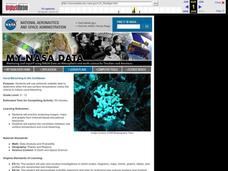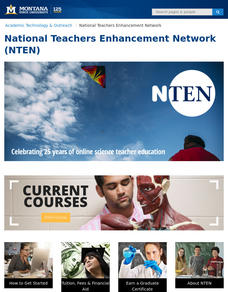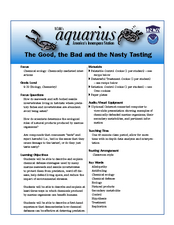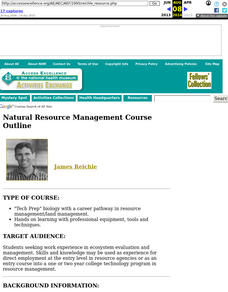Curated OER
Biological Sampling Device Using a Sea Perch
Pupils construct plankton nets to be towed and collect specimens to be examined and analyzed in the classroom. They develop research skills through collection of an aquatic sample. They write lab reports after interpreting, identifying...
Curated OER
The Effects of Ultra-Violet Light on Yeast
Students work in small groups collecting and analyzing data as they learn how to best grow yeast. This lesson allows students to conduct several student-created experiments as they continually generate questions and hypotheses. ...
Curated OER
The Ghost of Populations Past
Students study population distribution and survivorship curves by collecting data regarding age of death of humans from either tombstones, newspapers, or other community resources. Students analyze data by creating graphs and population...
Curated OER
Pheed the World: Edible Phyla
Young scholars discuss the contributions of different organisms to our world. In this biology lesson plan, students research countries with limited food supply. They create an improvement plan for a fictitious country assigned to them.
NOAA
A Matter of Density
Larvae transportation on the New England seamounts is based on the density of the water. Scholars calculate density and graph salinity versus temperature to better understand the distribution of organisms in a water column. Discussions...
Teach Engineering
All Fats Are Not Created Equal
Apply robotics to connect physical properties to chemical properties. Future engineers use robots to determine the melting points of various fats and oils. The robots can do this by measuring the translucency of the fats as they heat up.
Curated OER
Territorial Behavior in Crickets
Students explore the behavior of crickets during courtship. They measure the number and types of interactions between household crickets. Students discriminate between quantitative and qualitative observations. They collect data to...
Curated OER
Life in Extreme Environments - Lakes Under Ice
High schoolers collect chemical, physical, and biological data from a local lake throughout the year. In addition, students discuss the design of an experimental structure for water collection at several specific depths as well as assess...
Curated OER
Physical Habitat of a Stream
Students measure in metric units and use a stopwatch, calculator. They collect data with minimal instructions after the initial pre-activity briefing, then record data in the data sheets provided.
Curated OER
Studying Fossils: Dinosaur Tracks From Stride to leg Length to Speed
Students explore dinosaurs. Students determine the relationship between leg length, stride length, and speed in humans and bipedal dinosaurs. Students analyze collected information. Based upon the data, dinosaur tracks, and fossils,...
Curated OER
Human Evolution
High schoolers make and use observations of Laetoli footprints to provide clues to life in the past. They collect and analyze data to study the relationship between foot length and body height.
Curated OER
Water Quality Monitoring of Natural Water
Students set up their own monitoring system. They collect samples from an appropriate sampling site. They analyze data and determine the water quality. They present their information to the class and draw a conclusion.
Curated OER
Stream Chemistry Monitoring
Students become familiar with real-world gathering of chemical data. The experience how the science is done: the nature of analysis, data collection, interpretation, and presentation. They study a nearby body of water for their experiment.
Curated OER
Coral Bleaching in the Caribbean
Students use authentic satellite data on the NASA website to determine when the sea surface temperature meets the criteria to induce coral bleaching.
Curated OER
Life in Streams and Ponds
Students collect microorganisms, demonstrate correct laboratory/Gram stain procedure, and design and construct tables to organize data.
Curated OER
The Breathtaking Nature of the Urban Explosion, Part 2
Learners explore ozone levels. They measure the concentrations of ground-level ozone in the atmosphere. Students observe changes in the concentrations of ozone over time. Learners complete a data sheet to record ozone readings over a...
Curated OER
Fertilizer Frenzy
Pupils design and conduct an experiment testing the effect of fertilizers/soaps on algal growth. They estimate and predict, identify the variables, formulate a hypothesis, and record and analyze the data, presenting their findings in a...
Curated OER
The Good, the Bad and the Nasty Tasting
Students examine the effect of chemicals from marine plants or animals on predator's preferences. In this ecology lesson, students conduct taste tests and collect necessary data. They write their conclusion after analyzing experimental...
Curated OER
Feeling Crabby?
Pupils analyze data to investigate the influence of water depth on size among deep-water crabs. They interpret results from this data, and apply the results regarding appropriate fishery regulations.
Curated OER
Plant Biotechnology: Controlling Tissue Differentation
Students demonstrate skills of biotechnology stringent aseptic technique and statistical analysis. They describe hormonal control of plant tissue differentiation and relate this to gene expression. Students observe the effects of...
Curated OER
Lotic Environment
Students assemble a classroom river model as an example of a lotic system. They control and measure biotic and abiotic information for the in-class system and compare data with a lotic system in a natural environment.
Curated OER
Natural Resource Management Course Outline
Gain skills in ecosystem evaluation including chemical, biological, and physical qualities. Students write a report on a local ecosystem.
Curated OER
SeaWorld: Education, Entertainment, or Exploitation?
Students discuss SeaWorld, research marine animal biology, investigate one animal currently collected by SeaWorld, and decide whether they oppose or support SeaWorld's collection policy. Students then gather information relating to...
Curated OER
Cardiac Arrest! Using Forensics to Investigate Cardiovascular Anatomy and Function
Learners identify the different parts and functions of the cardiovascular system. In this forensics lesson, students collect and analyze evidence on a fictional crime. They describe different causes of cardiac arrest.

























